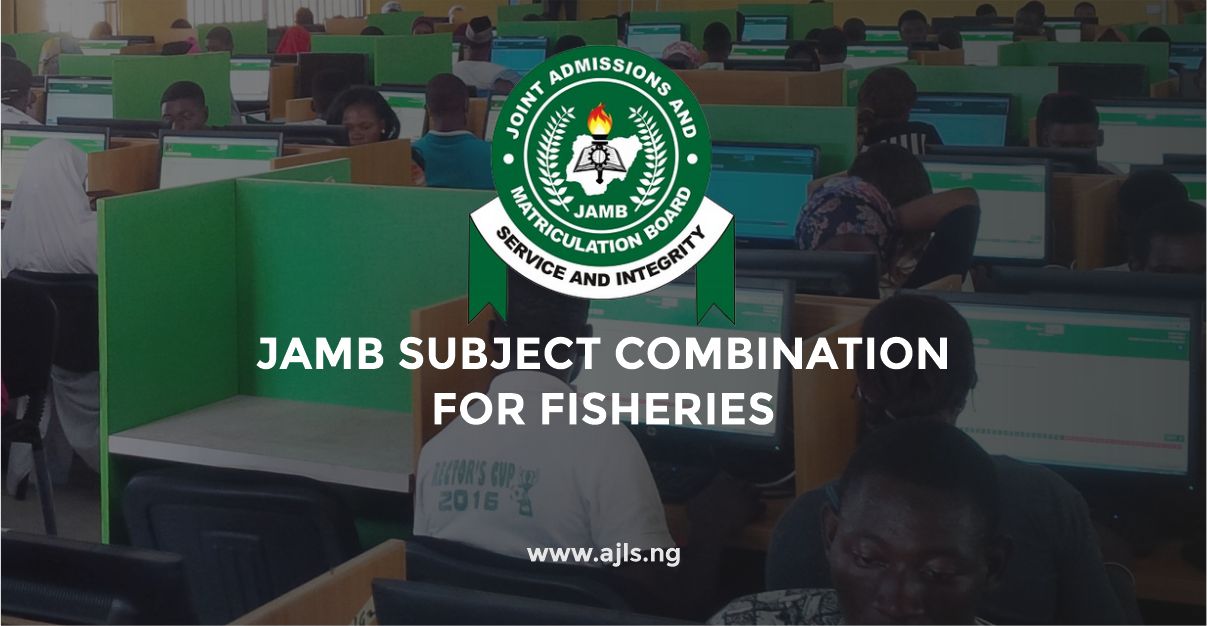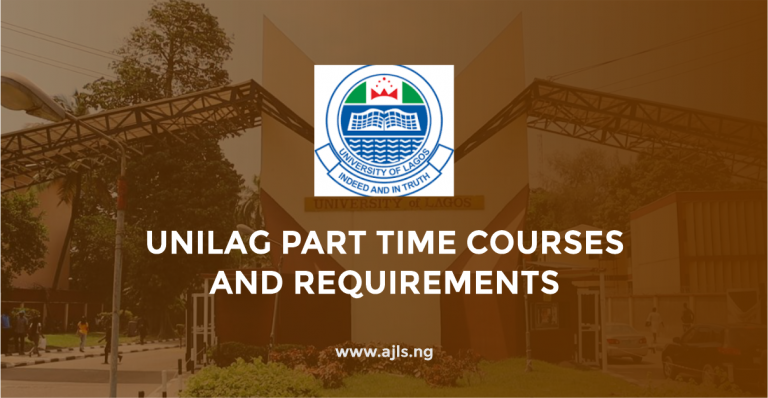JAMB Subject Combination for Fisheries

Fisheries is an academic discipline that focuses on the study of aquatic organisms, fish farming (aquaculture), fisheries management, and marine resource conservation. It is an essential field in agriculture and environmental science, contributing to food security, biodiversity conservation, and economic development.Fisheries as a course covers various aspects, including:
- Fish Biology and Ecology – Understanding fish species, their habitats, and life cycles.
- Aquaculture – The breeding, rearing, and harvesting of fish and other aquatic organisms.
- Fisheries Management – Sustainable exploitation and conservation of fishery resources.
- Marine and Freshwater Fisheries – Exploration of both saltwater and freshwater ecosystems.
- Fisheries Economics and Policy – Understanding the business, trade, and regulations governing fisheries.
Choosing the right JAMB Subject Combination for Fisheries is a crucial step in securing admission into any Nigerian university. If you are interested in studying Fisheries, you must ensure that you select the appropriate subjects in your JAMB (Joint Admissions and Matriculation Board) UTME to meet the requirements of your chosen institution.
This article provides a comprehensive guide on the JAMB subject combination for Fisheries, including additional admission requirements and career opportunities in the field.
JAMB Subject Combination for Fisheries
To be eligible for admission into Fisheries, candidates must register and sit for the following four subjects in the UTME:
- English Language (Compulsory for all JAMB candidates)
- Biology or Agricultural Science
- Chemistry
- Physics or Mathematics
This combination ensures that students have the foundational knowledge required to excel in Fisheries and related disciplines.
O’Level Requirements for Fisheries
Apart from the JAMB UTME subject combination, candidates must also meet the O’Level (WAEC/NECO/NABTEB) requirements for Fisheries. Candidates are required to have at least five (5) credit passes in the following subjects:
- English Language
- Mathematics
- Biology or Agricultural Science
- Chemistry
- Any other Science subject (such as Physics, Geography, or Economics)
These credits should be obtained in not more than two sittings.
Direct Entry Requirements
For candidates seeking Direct Entry (DE) admission into Fisheries, the following qualifications are generally accepted:
- Two (2) A-Level passes in Biology/Agricultural Science and Chemistry
- ND (National Diploma) or HND (Higher National Diploma) in relevant fields with a good grade
- NCE (National Certificate in Education) in Agricultural Science, Biology, or Chemistry
Comprehensive List of Universities Offering Fisheries in Nigeria
Fisheries is a vital field of study focusing on aquaculture, marine biology, and sustainable fishery resource management. Several universities in Nigeria offer Fisheries as a course, primarily under faculties of Agriculture, Environmental Science, Marine Science, or Renewable Natural Resources. Below is a detailed list of universities offering Fisheries in Nigeria, categorized by federal, state, and private institutions.
1. Federal Universities Offering Fisheries in Nigeria
Federal universities are government-owned and generally have lower tuition fees compared to private universities. The following federal institutions offer Fisheries as a course:
- University of Ibadan (UI) – Fisheries and Aquaculture Technology
- Federal University of Agriculture, Abeokuta (FUNAAB) – Aquaculture and Fisheries Management
- Federal University of Technology, Akure (FUTA) – Fisheries and Aquaculture
- Federal University of Technology, Owerri (FUTO) – Fisheries and Aquaculture Technology
- University of Lagos (UNILAG) – Fisheries and Marine Biology
- University of Calabar (UNICAL) – Fisheries and Aquaculture
- Federal University of Agriculture, Makurdi (FUAM) – Fisheries and Aquaculture
- Federal University, Dutse (FUD) – Fisheries and Aquaculture
- Federal University, Wukari (FUWUKARI) – Fisheries and Aquaculture
- Federal University, Dutsin-Ma (FUDMA) – Fisheries and Aquaculture
- Modibbo Adama University of Technology (MAUTECH), Yola – Fisheries and Aquaculture Technology
- Nnamdi Azikiwe University (UNIZIK) – Fisheries and Aquaculture
- University of Benin (UNIBEN) – Fisheries and Aquaculture
2. State Universities Offering Fisheries in Nigeria
These universities are owned by state governments and generally prioritize candidates from their respective states.
- Rivers State University (RSU), Port Harcourt – Fisheries and Aquatic Environment Management
- Lagos State University (LASU), Ojo – Fisheries and Aquatic Biology
- Delta State University (DELSU), Abraka – Fisheries and Aquaculture
- Ebonyi State University (EBSU), Abakaliki – Fisheries and Aquaculture
- Kogi State University (KSU), Anyigba – Fisheries and Aquaculture
- Abia State University (ABSU), Uturu – Fisheries and Aquatic Resources Management
- Enugu State University of Science and Technology (ESUT) – Fisheries and Aquaculture
- Ekiti State University (EKSU), Ado-Ekiti – Fisheries and Aquaculture
- Osun State University (UNIOSUN), Osogbo – Fisheries and Aquaculture
- Benue State University (BSU), Makurdi – Fisheries and Aquaculture
- Olabisi Onabanjo University (OOU), Ago-Iwoye – Fisheries and Wildlife Management
- Cross River University of Technology (CRUTECH), Calabar – Fisheries and Aquatic Science
- Nasarawa State University (NSUK), Keffi – Fisheries and Aquaculture
- Borno State University (BOSU), Maiduguri – Fisheries and Aquaculture
3. Private Universities Offering Fisheries in Nigeria
Private universities are known for their well-structured academic calendar and better facilities, though tuition fees tend to be higher. Some private universities offering Fisheries include:
- Adeleke University, Ede – Fisheries and Aquaculture
- Crescent University, Abeokuta – Fisheries and Aquaculture
- Babcock University, Ilishan-Remo – Fisheries and Aquatic Science
- Joseph Ayo Babalola University (JABU), Osun State – Fisheries and Aquaculture
- Fountain University, Osogbo – Fisheries and Aquaculture
Career Opportunities in Fisheries
Graduates of Fisheries have diverse career opportunities in various sectors. Some potential job roles include:
- Fisheries Biologist
- Aquaculture Specialist
- Marine Resource Manager
- Fisheries Extension Officer
- Environmental Consultant
- Research Scientist
- Fish Farm Manager
These careers span industries such as agriculture, marine research, environmental conservation, food production, and education.
Conclusion
Selecting the right JAMB subject combination for Fisheries is essential for a successful application to any Nigerian university offering the course. Ensure that you meet both the UTME and O’Level requirements, and explore Direct Entry options if applicable.
Fisheries is a rewarding field with numerous career opportunities, making it a great choice for students passionate about marine life, aquaculture, and environmental sustainability. If you have any questions regarding admissions, always refer to the official JAMB brochure or visit the website of your preferred university for up-to-date requirements.





